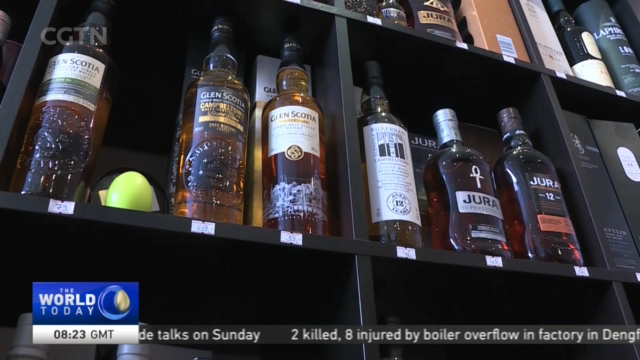
16:45, 01-Jun-2019
German Whiskey: Local distilleries eye gains amid Brexit, tariffs on US
Updated
13:12, 02-Jun-2019
02:47

Germany might not be celebrated for its whiskey, but the country is home to more than a hundred distilleries, mainly focused on small-scale production. Now with EU tariffs on American whiskey, and the Scotch industry facing concerns over Brexit, could German whiskey be ready to take off? CGTN's Ira Spitzer reports.
"This is where the magic happens."
Germans are known for beer and sausages. Whiskey? Not so much.
"Basically this is the fermented rye mash."
But a handful of small German producers like the Spreewood Distillery outside Berlin are trying to change that.
BASTIAN HEUSER CO-FOUNDER, SPREEWOOD DISTILLERS "There has been a growing interest in what we call world whiskey, so whiskey from other regions besides the classic or typical whiskey regions, Scotland, Ireland, USA, Japan."
EU trade tensions with the US have led to tariffs on American whiskey, and Brexit may hamper sales of Scotch. That might give the likes of Spreewood an opportunity. The founder thinks German customers may be intrigued by his Stork Club rye whiskey, if prices rise on brands like Jack Daniels and Johnnie Walker.
BASTIAN HEUSER CO-FOUNDER, SPREEWOOD DISTILLERS "Then people will probably say that's cool, I can have a small, manufactured craft product for the same price as a big industrially produced product."
The UK and the US are the world's two largest whiskey producers. Scotch exports alone were worth around six billion dollars last year with the EU as the top market.
IRA SPITZER SCHLEPZIG, GERMANY "German whiskey isn't going to match the popularity of scotch or American whiskey anytime soon though. The German whiskey distillers association says it accounts for less than half a percent of worldwide production."
Worried about possible disruptions, the Scotch Whisky Association has demanded that UK leaders avoid a no deal Brexit. However, unlike American whiskey, WTO rules protect Scotch whiskey from tariffs, so the net impact of Brexit is unclear.
MICHAEL WOHLGEMUTH DIRECTOR, OPEN EUROPE BERLIN "If you would have no tariffs into the EU, and you would also see an exchange rate effect which means that the British pound would become more attractive because it devalues, actually exports into the EU could increase."
Back at Spreewood, Hauser says he doesn't see much positive about Brexit anyway, even if there is a short term boost, since it might complicate HIS plans to export to the UK. In any case, for now, he's mainly concerned with spreading the message about his whiskey, one glass at a time. Ira Spitzer, CGTN, Schlepzig, Germany.

SITEMAP
Copyright © 2018 CGTN. Beijing ICP prepared NO.16065310-3
Copyright © 2018 CGTN. Beijing ICP prepared NO.16065310-3